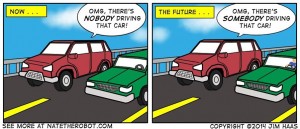Posted in November 2015
Re-run MOOC Responsible Innovation announced on EdX-platform
The MOOC Responsible Innovation has just been announced on the EdX website, so enrolment can start. Please go to: https://www.edx.org/course/responsible-innovation-delftx-ri101x-0
As a result of the Surf-project we will be able to offer our students an E-book on the course. Sofia Kaliarnta, PhD candidate at the Philosophy Department of TPM, is busy preparing the final version.
We will also conduct a new experiment: Student who opt for a verified certificate will get a manual grading of their final assignment. This is still a bit of a technical puzzle as the EdX-platform is not designed with this in mind! But no doubt we will manage.
Experiment with integrating MOOC in our minor Responsible Innovation
As part of our minor Responsible innovation for students from Leiden, Delft & Rotterdam,, students had to study the ‘Responsible Innovation MOOC’ . With each of the seven chapters, each student had to write a column related to the topic, and all of these were then shared on a collaborative research platform. Caroline Nevejan, the responsible teacher, will write an article on this experiment and draw lessons for the future.
See also this article in the magazine Delta: http://delta.tudelft.nl/article/responsible-innovation-course-combines-mooc-and-collaborative-learning/30679/
Workshop on Responsible Education in Leuven, October 2015
Introduction
To celebrate its 25th anniversary, CESAER (Conference of European Schools for Advanced Engineering Education and Research) organized a conference titled Healthy living, healthy ageing – a challenge for medicine and engineering in Leuven on October 7, 2015. Part of the conference was a workshop on Responsible Research & Innovation organized by the TU Delft.
During this workshop we focused among other things on education in Responsible Innovation (RI)
Context
CESAER is a non-profit international association of leading European universities of science and technology and engineering schools/faculties at comprehensive universities and university colleges. The organisations CESAER stands for scientific excellence in engineering education and research, and the promotion of innovation through close cooperation with industry in order to ensure the application of cutting-edge knowledge in industry and society. CESAER was established in 1990 and now has a membership of 50 institutions from 24 countries. CESAER has a task force (http://www.cesaer.org/en/projects/responsible-research-and-innovation-rri/). The overall goal of the taskforce is to deepen our understanding of responsible innovation and contribute to inserting this idea in key places in society (universities, government bodies, industry, and funding agencies).
Workshop
During the workshop we discussed the following issues: (see also our presentation: Cesaser workshop.final. )
- What does an engineer need to know about RRI?
- How does this differ for the different type of engineers?
- What is the most appropriate didactical approach?
- Can we build up a repository for the content including best practices?
- How should we train professionals?
We used self-driving vehicles as running example (see this MOOC-video by professor Bert van Wee (Transport Policy at Delft University of Technology). Noteworthy from the workshop is that awareness is still a very an important issue! RI is not easy to define, at the same time you know what RI is if you see it!
Joost Groot Kormelink


Recent Comments